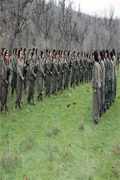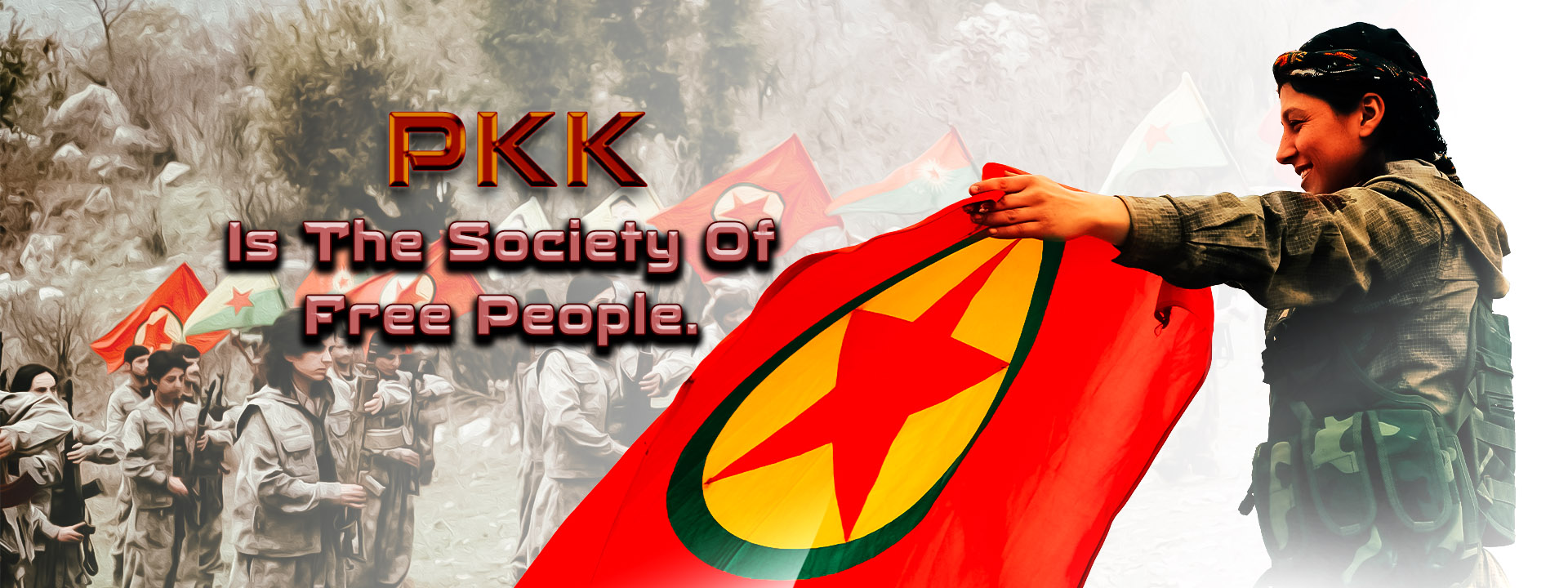 In Kurdistan to be Kurdish was banned, to be Kurdish was made to be a source of shame. This for women meant no identity and a deeper exploitation of labour; persecution and violence had become fate.
In Kurdistan to be Kurdish was banned, to be Kurdish was made to be a source of shame. This for women meant no identity and a deeper exploitation of labour; persecution and violence had become fate.
Kurdistan is multi-colonial. Kurdistan is not a state, but it is proud to be the biggest stateless nation of the world. There were times previously where this was bemoaned of; however, this always succumbed to the pride that came with being the Middle East’s pioneering freedom movement struggling against Imperialism. In written history – written by the sovereigns – the name of Kurdistan, its existence, its culture and its people were never mentioned. This meant that Kurdistan was to be an unknown entity which was subsequently abandoned to the mercy of the sovereign states. This led to a struggle for existence, while existing. It is for this reason that only to be born in the midst of this history forces upon you a constant mode of resistance in which great sacrifices are made. This resistance and the sacrifices that come with it, take a deeper and intensified shape for the women of Kurdistan.
Today, millions of Kurdish women around the world regularly take the streets to struggle for their freedom. These are values that have derived from great resistance. In Kurdistan to be Kurdish was banned, to be Kurdish was made to be a source of shame. This for women meant no identity and a deeper exploitation of labour; persecution and violence had become fate.
The women of Kurdistan however, never accepted any of these as their destiny. To not accept this and to struggle, meant that they had to construct their own freedom. The Kurdish women’s search for freedom began with the Kurdistan Freedom Movement, or to be more precise, with the childhood dreams of Abdullah Ocalan. Even at a very early age Abdullah Ocalan’s disapproval of society’s extreme feudality was to show in his attempts to befriend girls of his age, and to include them in their games. At that very young age, even if it was not very consciously done, Abdullah Ocalan made resistance against society’s backward traditions a lifestyle in order to live freely with women and to live with free women.
Abdullah Ocalan’s desire to emancipate humanity through the emancipation of the woman was and is a fundamental motivator in his thoughts. The women of Kurdistan always played an active and leading role in the resistance. At first, the women of Kurdistan were organising themselves within the ranks of the Kurdistan Freedom Movement, the PKK. Although in the first years of the PKK there were not many women throughout the organisation, the women that had joined the PKK were women with insurmountable desires for women’s liberation. The role played by women in the PKK becoming a mass movement is extremely significant.
When the PKK began its guerrilla war on the 15th of August 1984, Kurdish women were pouring into the ranks of the PKK. At first, women were joining to liberate the Kurdish people through popular resistance, but through time it was becoming clear that there was a need for an independent path of resistance for the women of Kurdistan. When we analyse the feudal characteristics of Kurdish society of the time, it is understandable why Kurdish women decided to organise independently in order to better fulfil their role in the liberation movement.
Women fighters in the ranks of the PKK established YJWK (the Union of the Patriotic Women of Kurdistan) in 1987. YJWK is the first revolutionary and liberationist movement of the women of Kurdistan. This organisation was not only aimed at Kurdish women, revolutionary women from all over the world joined the organisation. The joining of the guerrilla ranks was not seen as a simple participation in a war. Guerrilla life was seen as the overcoming of the lifestyle asserted by the system by creating the will to live independently of any other external power.
Alongside the struggle against natural conditions, major efforts against the enemy and the patriarchal system were all administered hand in hand. This laid the foundations for a woman’s army. While the women of Kurdistan were being left with no identity, under the PKK women were forming armies. On the issue of a woman’s army our leader Apo stated: “a woman’s army is not only a requirement for the war against the patriarchal system, but is also a requirement in opposition to sexist mind-sets within the freedom movement. Instead of traditional lifestyles and relationships, relationships based on freedom must be adopted; the synthetic dependence of women to men must be overcome by free choice.”
The women of the PKK later formed YAJK (the Women’s Kurdistan Liberation Union) in the mountains of Kurdistan. YAJK was the women’s pioneer of war, education and self-evaluation and took on the responsibility of the transformation of men. This is how our leader Apo defined YAJK: First, YAJK means the attainment of the highest possible sentiments for one’s county. This means that even if everyone gives up on their country, YAJK continues the struggle. Second, YAJK is a reality of war. Here there is a national liberationist war. YAJK is well aware that this war is the fundamental component of its existence. War is a basic principle for YAJK. However, this does not only mean military war; this war is internal as much as it is external. Third, YAJK is a partisan force. It is most devoted to the principles and ideals of the party (PKK). Without the struggle of the PKK it is clear that the women’s liberation movement could not have taken these major strides. Therefore, the devotion and internalisation of the PKK is a vital responsibility for YAJK.
The 90’s was a time in which the war and international pressure intensified; however, it was also a time for developments and mass participation to the Women’s Liberation Movement. While Kurdish women were taking major military strides, they were also leading the mass resistances. As a result of these developments the now experienced movement was beginning to push for new openings. The year of 1997 was a year of significant progress for the woman’s liberation movement. On the 8th of March 1998, by announcing the Women’s Liberation Ideology our leader Apo integrated the struggle of the women of Kurdistan with the struggle of the women of the world. The announcement of this ideology in many ways represented a first among ideologies of societal emancipation. This ideology does not carry a simple ambition of the equality between the sexes. Rather, it aims to reorganise the whole of society by renovating the matriarchal order of life that existed in natural societies.
The Basic Principles of the Women’s Liberation Ideology
I. Patriotism: Our leader Apo says “Before everything women’s ideology cannot exist without land. The art of harvest and the art of production are connected to women’s artistry. This means that the first principle of the women’s ideology is a woman’s connection to the land it is born on; in other words, patriotism.”
II. The principle of free thought and free will: “the second principle is the woman’s ability to think freely and develop a free will in its participations to social life. If this ideology is to succeed, women must be able to live as they wish and make decisions accordingly. We must trust in their decisions and respect their will. This is an indispensible principle for this ideology.”
III. A sharing of life based on freedom and the principle of organisation: “For any of the above to materialise an organisational structure is vital. An unorganised individual is nothing. The first social structures are organised around women. Women must take their organisational structures seriously, as men have many organisations. Women must generalise their organisation – this is what today we are calling YAJK.
IV. The principle of resistance: “Women must see life as a domain for resistance. This is because without resistance women are being kept captive between four walls. Women are being loitered with simple tasks; therefore, to counter this, women must empower themselves by resisting in every possible way.
YAJK subsequently initiated educational seminars around these principles. The situation of the PKK militants in the mountains of Kurdistan enabled them to break off from the sovereign system and consequently enabled them to construct their own values and thought systems. For female militants this carried extra significance. The ability to carry out military actions, the ability to defend themselves and the ability to establish free thought brought about significant developments for female PKK militants. This led to the eventual establishment of PAJK (the Free Women’s Party of Kurdistan) which is today continuing this line of resistance.
Since the year 2000, our leader Apo’s new democratic, ecological and gender equal paradigm has been a complimentary addition to the history of the women’s struggle in Kurdistan. In Kurdistan the materialisation of this paradigm has been most evident in the women’s struggle. The fact that a fundamental aspect of the new paradigm is gender equality has integrated the women of Kurdistan with the women of the world.
The women of Kurdistan formed their democratic confederal umbrella organisation in 2005. This system is formed of four fundamental components:
1- The women’s ideological movement PAJK
2- The women’s social movement YJA (the Free Women’s Union)
3- The women’s self-defence force YJA-STAR
4- The young women’s organisation
The women of the Kurdistan freedom movement come together under the umbrella organisation called the KJB. These four main fields all organise and plan their work independently but come together in the formation of wider strategies. As we come to the end of an article in which we have tried to briefly introduce the Kurdistan women’s movement, it is probably appropriate to finish with the latest development: Jineology (the original version of this word is Kurdish and is derived from the Kurdish word for woman, jin. An exact definition would probably be womanology).
Jineology as a term was coined by our leader Apo as a fundamental scientific term in order to fill the gaps that the current social sciences are incapable of doing. Jineology is built on the principle that without the freedom of women within society and without a real consciousness surrounding women no society can call itself free. Jineology is formed on the criticism that existing scientific disciplines are structured within the framework of capitalist modernity and therefore are extremely divided and fragmented. Jineology, on the other hand, foresees a wholesome approach to humanity, society and the universe and this is why rather than being a new scientific discipline jineology is a new epistemological approach fuelled by a conscience of freedom.
Delal Afsin Nurhak
http://www.pkkonline.net/en/index.php?sys=article&;artID=180



